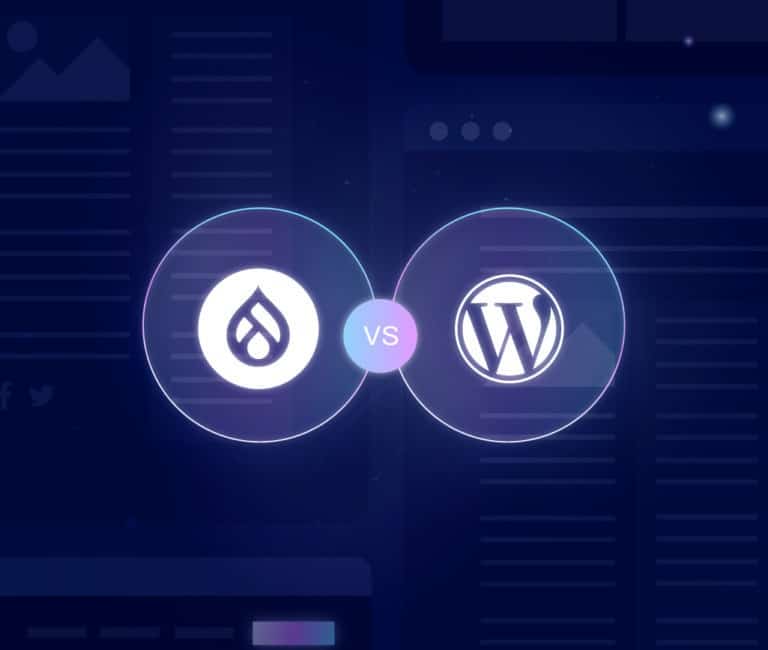Technology
10 minute read
Drupal vs WordPress: Which Is the Right Choice?.
LAST UPDATED:
June 27, 2023


Marketing managers bear the brunt of the decision-making when it comes to website design and development.
One of the most common questions you face is: which content management system (CMS) should you choose for your website?
All the lists of the best CMSs online include WordPress and Drupal. Perhaps the two should be your top choices as well!
Choosing between Drupal and WordPress can be tough, but we’re here to help you make the best decision for your business.
Drupal and WordPress are two of the most popular CMSs out there.
If you Google them, you’ll find people listing their advantages, how they helped their businesses, and their top features.
Let’s take a look at their beginnings and how they grew into what we know today.
Drupal

Drupal was created in 2001 by Dries Buytaert and Hans Snijder, students at the University of Antwerp in Belgium.
They originally wanted to create a message board for their friends, but they soon realized that the current software wasn’t good enough.
So, they made their own.
Drupal became popular because it is an open-source CMS.
This means that anyone can contribute to its code and developers can create Drupal modules to add new features to the CMS.
Drupal is known for its flexibility and scalability. Some of the world’s largest websites use it, including The Economist, whitehouse.gov, and Weather.com.
Dries first considered the domain name “dorp.org.” “Dorp” means “village” in Dutch, and he believed it fit their small community.
However, he mistyped the domain name when he registered it, turning “dorp.org” into “drop.org.”
And, when the domain went live, the website became a place for new web technologies, personal experimentation, and endless ideas.
In January 2001, Dries renamed the software “Drupal,” derived from the Dutch word “druppel.” “Druppel” is Dutch for “drop,” and “Drupal” has since been the name of the CMS.
Now, Drupal has over one million users worldwide and a market share of 1.03%.
WordPress

WordPress was created in 2003 by American and British bloggers Matt Mullenweg and Mike Little. Initially intended to be a blogging tool, it has since evolved into a full-fledged CMS.
WordPress was the successor of “B2/cafelog,” a blogging tool developed by French programmer Michel Valdrighi in 2002.
When Valdrighi stopped developing, Mullenweg expressed that he was willing to continue work on the software.
WordPress became popular because it is an open-source CMS with a large community of developers and users.
It is known for its ease of use and wide range of plugins and themes.
WordPress powers over 30% of the internet, including The Guardian, Forbes, and TechCrunch.
The name “WordPress” was a suggestion by blogger Christine Selleck.
In January 2004, they began naming major releases after famous jazz musicians.
It wasn’t until February 2005 that they introduced WordPress site themes and layouts for the designs.
Many of them were created by users themselves. In 2021, WordPress had over 455 million users, with a 41.28% market share.
It’s mind-blowing that Drupal and WordPress have remained relevant and powerful for two decades.
With their long history, you would think that Drupal and WordPress are quite similar. But, they’re not — not by a long shot.
Here are some key differences between Drupal and WordPress:
General Overview
Let’s start with one of the major factors that you consider when choosing a CMS: budget. Drupal is an open-source CMS that allows you to download and use the platform for free.
A Drupal website has Drupal modules, which allow you to freely add features to your website.
However, if these standard sets aren’t enough for your business projects, you’ll need to develop additional modules.
This is where you’ll need to invest some money.
Drupal will always be free, but customizing requires a budget.
On the other hand, WordPress is free as well, and users rarely opt-in for paid upgrades.
Upgrades for WordPress are only necessary if you need specialized features for your website that are not available in the free plugins.
WordPress has different pricing for different packages, and billing is either monthly or annually.
- Personal – $6
- Premium – $13
- Business – $27
- eCommerce – $48
The winner in our first round of Drupal vs WordPress is both.
Drupal and WordPress are both initially free, and the costs vary depending on the necessary features for your website.
Theme Design and Customization

Drupal themes are developed in HTML, and users determine the coding. Drupal’s website includes tutorials and advice on how to create a theme.
These themes are brought to life by front-end and back-end developers working together.
Drupal’s modular structure makes unique Drupal themes. You can purchase premium Drupal themes if you don’t want to keep creating your own.
Drupal is more of a DIY platform. It’s an open-source CMS, so it can be easy and challenging to edit. It’s easy if you know how to code and complicated if you don’t.
Drupal requires knowledge of different computer languages like HTML, CSS, JavaScript, and PHP.
On the other hand, WordPress themes are developed with code that WordPress generates.
Users don’t need to know how to code to create a WordPress theme.
All you need is creativity and some knowledge of CSS. You can find free and paid themes on their website!
In this round, WordPress wins because they have superior non-technical editing options.
It’s more friendly for marketing managers and teams who want to design their own website without learning to code.
Redesigning also becomes possible! It’s much easier to edit according to your branded colors and fonts.
If you weigh the pros and cons of the two CMSs, the winner depends on your team’s skill.
If you’re working with a team of developers, Drupal is the way to go.
If you have a team of designers, then WordPress is better.
Plugins and Integrations
Drupal has more than 40,000 plugins called modules, while WordPress boasts about 55,000 plugins.
Which CMS has a better ecosystem?
Drupal lets users search for modules based on what they need for their website.
The controlling module is the basic framework or the interface, and other modules create plugins that implement the interface with certain behaviors.
All plugins are grouped into plugin types managed by a plugin manager service.
WordPress has plugins created by designers and developers in and out of the CMS.
Some top plugins include Elementor Website Builder, a popular page builder, and Classic Editor.
WordPress allows you to use the CMS however you like.
In this round of Drupal vs WordPress, both have their advantages. Drupal makes it easier for developers to manage plugins, while WordPress gives more freedom to its users.
Both provide thousands of plugins that you can maximize for a website that’s unique to your brand!
When it comes to quality control, however, WordPress wins.
They have a handbook for designers and developers, so even beginners can create amazing plugins.
Drupal also has a bunch of resources, letting outside developers create modules specifically for Drupal.
Still, users must have developer knowledge of Drupal’s coding standards.
SEO

Drupal and WordPress differ in the way they approach SEO.
Drupal has a module that takes care of all your SEO needs, while WordPress has a plugin that does the job.
It’s important to remember that your CMS doesn’t directly affect your SEO ranking.
SEO is more about the quality of your content, how you use keywords, and how you structure your website.
Drupal’s approach is to give users the ability to customize their website according to the latest SEO practices.
Its core modules take care of site performance, security, and other technical aspects that Google considers in its ranking algorithm.
Drupal also has a module that creates XML sitemaps, which is vital for search engine crawlers.
WordPress, on the other hand, takes a more hands-off approach. It uses a popular plugin, Yoast SEO, to handle all your SEO needs.
Yoast SEO is a plugin that helps you with keyword research, site structure, and content optimization. It might be just a plugin, but it works great and keeps up with the latest SEO trends!
In the Drupal vs WordPress SEO debate, it’s a tie. The two have plugins and modules that ensure your website is aligned with the latest SEO practices.

Both Drupal and WordPress have evolved from small systems into powerful content management platforms. It’s amazing to see these platforms continue to grow and flourish as their communities of developers increase.
Caleb Shultz, Director of Projects
Security
Drupal’s security measures depend on your code.
You can find resources on how to protect your website, and Drupal updates users about any vulnerabilities.
You can work on the security of your generated PHP files, codes, configurations, and authentication credentials.
Basically, you’re in charge of the security of your Drupal website, and Drupal supports you with resources.
WordPress also has its own security measures, but it’s not as hands-on as Drupal.
WordPress regularly updates platforms and runs automatic updates in the website background.
They have a security team of approximately 50 experts, supporting users and investigating potential threats.
In terms of security, Drupal has the edge over WordPress. Both ensure that users know all about the latest threats and have the tools to protect their websites.
However, WordPress has had several security issues and concerns. Drupal’s user-dependent security system gives it an advantage.
Maintenance or Long-Term Support
Drupal updates monthly, and they have a set development frequency.
They have a core release cycle for major, minor, and patch releases, ensuring that your website always has the latest Drupal version.
Drupal Long-Term Support (Drupal LTS) provides users extended support for Drupal core releases and security coverage.
WordPress has a similar update cycle, but plugins must be regularly checked and updated.
Outdated plugins are a security risk, so you must be on top of things if you’re using WordPress.
So, for maintenance and LTS, Drupal’s regular update schedule gives it an advantage over WordPress.
It’s easier for your team to schedule routines for updates and maintenance. With WordPress, performance optimization becomes more challenging to schedule according to its updates.
If you’re looking for support for your website, both CMSs have a large community to turn to.
Drupal’s guidelines for various categories and support pages allow you to find the help you need.
WordPress also has a dedicated page for support and a vast community in its forums. The two don’t leave you after you create your website!
Also, Drupal has over one million developers in its community.
For WordPress, however, it’s difficult to tell how because many work freelance while some have their own business.
Nevertheless, it’s safe to say that there are more WordPress developers than Drupal. It’s most probably because of how generally easier it is to use WordPress.

Open Source
Drupal’s source code is available for anyone to download and use.
You can customize your Drupal website to your liking and add any features you want for your website.
It’s an excellent choice for developers with enough coding knowledge to build a website from scratch.
Wide Variety of Modules
Drupal has a wide variety of modules, with over 40,000 to choose from.
For every possible website need you might have, Drupal has a module for it!
Customizable
Drupal is what you make of it.
You can create anything on this platform as long as you have the skill and imagination!
Huemor’s Overall Take
Drupal is an oasis for developers.
If you’re aiming for a website with complex integrations, Drupal is the better choice.
It gives you the power to create the website of your dreams.

Less Learning Curve
WordPress is easier to learn and use.
The platform is user-friendly, and you don’t need to know how to code to create a website.
Lots and Lots of Resources
With over 40% of the market share, WordPress is the most popular CMS in the world.
You can find almost anything you need online for your WordPress website, from themes to plugins to tutorials.
Third-Party Integrations
WordPress has a vast selection of plugins, with over 55,000 choices.
The platform makes it easy to integrate them into your website.
Huemor’s Overall Take
WordPress has gotten a bad rap for being bloated, slow, and challenging to manage.
However, that has much more to do with the craftsman (developer) than with the tool (WordPress).
A well-built WordPress website can meet and exceed the needs of any growing business.
It’s an excellent solution for mid-sized businesses with some but limited in-house technical expertise.
For your general corporate website, Huemor suggests WordPress as an optimal solution.
For large, heavily data-driven sites, Drupal has an edge. Ultimately, both platforms are beneficial depending on your website goal.
It’s up to you if you want to drop the most cutting-edge website with Drupal or press the all-in-one button with WordPress.
Want to bounce ideas off of web design experts? Contact us!
Get Memorable Insights.
Sign up to receive actionable web design advice directly in your inbox monthly.
Get Memorable Insights.
Sign up to receive actionable web design advice directly in your inbox monthly.
Author
Jeff Gapinski is the President of Huemor where he helps plan the long-term strategic growth of the agency. Jeff is passionate about UI/UX, demand generation, and digital strategy.
What Do You Think?
Have feedback? Maybe some questions? Whatever it is, we'd love to hear from you.








No comments found